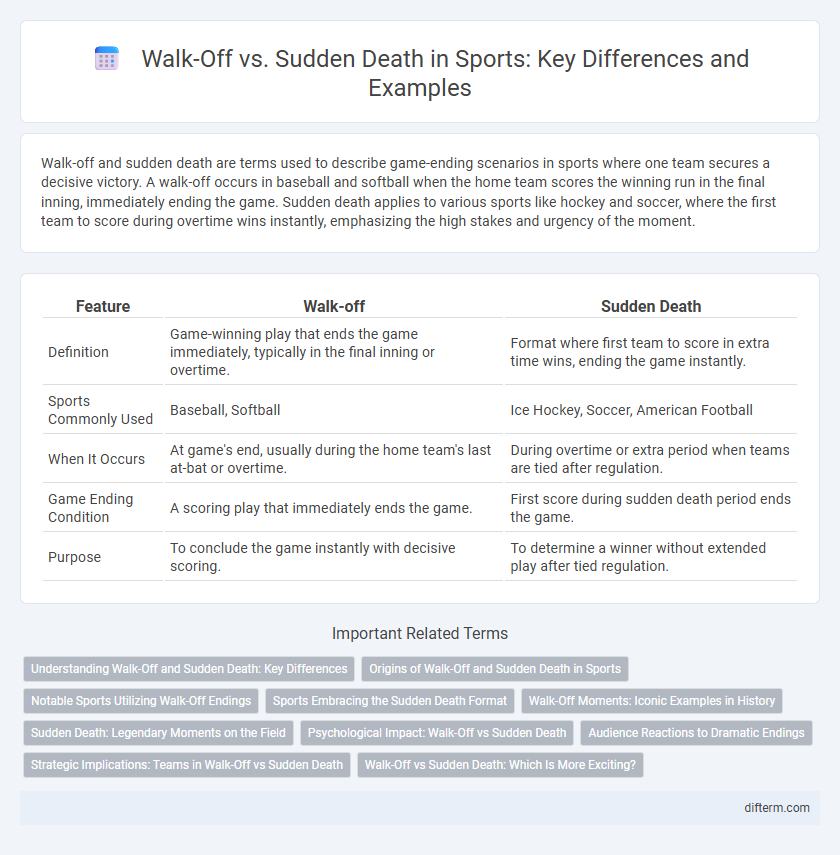Walk-off and sudden death are terms used to describe game-ending scenarios in sports where one team secures a decisive victory. A walk-off occurs in baseball and softball when the home team scores the winning run in the final inning, immediately ending the game. Sudden death applies to various sports like hockey and soccer, where the first team to score during overtime wins instantly, emphasizing the high stakes and urgency of the moment.
Table of Comparison
| Feature | Walk-off | Sudden Death |
|---|---|---|
| Definition | Game-winning play that ends the game immediately, typically in the final inning or overtime. | Format where first team to score in extra time wins, ending the game instantly. |
| Sports Commonly Used | Baseball, Softball | Ice Hockey, Soccer, American Football |
| When It Occurs | At game's end, usually during the home team's last at-bat or overtime. | During overtime or extra period when teams are tied after regulation. |
| Game Ending Condition | A scoring play that immediately ends the game. | First score during sudden death period ends the game. |
| Purpose | To conclude the game instantly with decisive scoring. | To determine a winner without extended play after tied regulation. |
Understanding Walk-Off and Sudden Death: Key Differences
Walk-off and sudden death are decisive moments in sports that determine the immediate outcome of a game. A walk-off typically occurs in baseball when the home team scores the winning run in the bottom of the final inning, ending the game without extra innings. Sudden death, common in hockey and soccer, involves an overtime period where the first team to score wins, instantly concluding the match.
Origins of Walk-Off and Sudden Death in Sports
Walk-off victories originated in baseball, referring to a game-ending hit or play that immediately concludes the match as the home team takes the lead in the final inning, emphasizing its origin in Major League Baseball's late 19th-century rules. Sudden death emerged primarily in sports like hockey and football, with roots tracing back to early 20th-century efforts to resolve ties quickly by ending the game at the moment one team scores in overtime. Both concepts revolutionized the way extra play is handled, ensuring decisive outcomes without extending the contest indefinitely.
Notable Sports Utilizing Walk-Off Endings
Walk-off endings are prominently featured in baseball, where a walk-off hit immediately ends the game as soon as the winning run scores in the bottom of the final inning. Unlike sudden death formats used in sports like hockey or soccer overtime, walk-offs emphasize a decisive, offense-driven conclusion within regulation play. Notable examples include MLB's World Series games where walk-off home runs have created iconic championship moments.
Sports Embracing the Sudden Death Format
Sudden death in sports offers an intense and definitive conclusion by immediately ending competition upon a deciding score, heightening fan engagement and athlete pressure. This format contrasts with walk-off scenarios, where a scoring play in the home team's final inning or period concludes the game without extra play. Many major leagues, including the NHL and various soccer tournaments, embrace sudden death overtime to ensure swift resolutions while maintaining competitive fairness.
Walk-Off Moments: Iconic Examples in History
Walk-off moments in sports capture dramatic game-ending plays that instantly seal victory, often etching themselves into history. Iconic examples include Bill Mazeroski's 1960 World Series home run and Kirk Gibson's 1988 World Series walk-off homer, both immortalizing their teams' triumphs. These moments highlight the tension and excitement unique to walk-offs, where a single play concludes the contest without the need for extra periods.
Sudden Death: Legendary Moments on the Field
Sudden Death in sports refers to an immediate win condition that concludes the game the moment a team scores, creating intense and unforgettable moments. Legendary instances include playoff basketball games where a last-second shot ends the match or overtime in soccer where a golden goal decides the championship. These high-stakes moments define careers and captivate fans with their dramatic and instantaneous resolutions.
Psychological Impact: Walk-Off vs Sudden Death
Walk-off victories in sports create an immediate psychological high by delivering instant gratification and elation for the winning team, often boosting confidence and morale significantly. Sudden death situations heighten stress and anxiety due to their unpredictable and high-stakes nature, forcing athletes to maintain intense focus and resilience under pressure. The contrasting mental demands influence athlete performance, with walk-offs fostering celebratory momentum and sudden death testing emotional regulation and composure.
Audience Reactions to Dramatic Endings
Walk-off wins in baseball ignite explosive crowd celebrations as fans erupt with joy, capturing the thrilling finality of the game's decisive moment. Sudden death scenarios in sports like hockey or football intensify audience emotions, blending anxiety and excitement as every play can instantly determine the winner. Both types of dramatic endings heighten fan engagement, creating memorable experiences amplified by the unpredictability and high stakes of the conclusion.
Strategic Implications: Teams in Walk-Off vs Sudden Death
Teams in walk-off scenarios prioritize aggressive offensive strategies to secure an immediate win, leveraging the home-field advantage for decisive hits or runs. In sudden death situations, teams emphasize conservative defense and error minimization to avoid early elimination, often resulting in heightened pitching changes and tactical bunting. Understanding these strategic nuances impacts managerial decisions and player roles under high-pressure conditions.
Walk-Off vs Sudden Death: Which Is More Exciting?
Walk-off finishes in sports like baseball create dramatic, game-ending moments with a single play, energizing fans instantly. Sudden death formats, common in hockey and soccer, maintain intense suspense by continuing play until the first score, amplifying pressure for all players involved. Both walk-off and sudden death scenarios heighten excitement by delivering unpredictable conclusions, but walk-offs often offer a quicker, more explosive climax.
Walk-off vs Sudden Death Infographic

 difterm.com
difterm.com